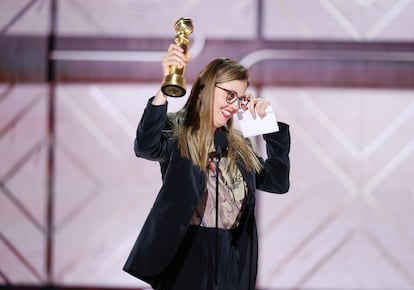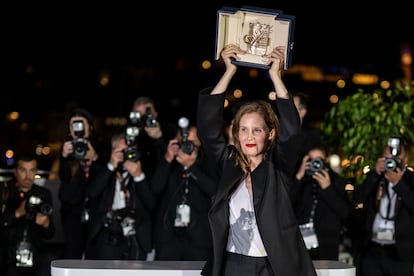‘Anatomy of a Fall’: The miracle of a film that France rejected for the Oscars
Director Justine Triet once believed that her movie, nominated for five Academy Awards, would not have any success or impact. After conducting an impeccable campaign in the United States, with dogs and ‘hot lawyers’ included, anything is possible at Sunday’s ceremony

“It will be a very long film that will not have any success at the box office.” This was the forecast that Justine Triet repeated over and over again to her producers while shooting her latest movie a couple of winters ago. In the project in question, the characters would not stop getting into violent dialectical fights, the underlying theme would be the utopia of full equality in the heterosexual couple, and the music was going to be conspicuous by its absence, except for a repetitive instrumental remix of an old 50 Cent song. Anatomy of a Fall, which could be understood as the simple story of a woman accused of killing her husband, had everything going for it to confirm Triet’s prediction. That is until, against all odds, it became the miracle of the year.
The film has been nominated in five categories at this Sunday’s Academy Awards ceremony, including Best Motion Picture of the Year and Best Achievement in Directing, alongside Martin Scorsese and Christopher Nolan. It is also the favorite to win for Best Original Screenplay. The story was written by Triet and her partner, Arthur Harari, and it is difficult not to see elements of autofiction in it. Acquired by 155 countries, including Iraq, Vietnam and China, where it will be released at the end of March, the film has been seen by 1.6 million viewers in France and the same number in the international market. In the U.S. it has made $4 million at the box office, while in Spain it has exceeded 200,000 viewers, a European record that is only surpassed by Germany — where the lead actress, Sandra Hüller, comes from — with almost 300,000 spectators.

In addition to the initial push delivered by its Palme d’Or victory at Cannes and its undeniable qualities, one of the reasons for its success has also been the campaign run by its American distributor, Neon, which was worthy of the glory days of Miramax in the 1990s. The movie poster underlined the film’s link to the courtroom thriller, a somewhat higher-grossing genre than the marital drama, with this tagline: “Did this woman kill her husband?” Readings of the script were organized with famous actors, including Riley Keough and Bob Odenkirk, after which the public had to vote whether the main character was innocent or guilty. Neon, which previously distributed the Oscar-winning Parasites, turned Messi, the border collie who plays Snoop — “the only one who knows the truth,” according to Triet — into a central element of the marketing campaign: there has not been a star in recent weeks, from Bradley Cooper to Emma Stone, who has not been photographed with the dog. Meanwhile, the digital strategy involved viralizing the videos of actor Swann Arlaud, the “hot lawyer” in the film, as Triet called him, perhaps not by chance, when collecting one of her two Golden Globes.
If we add its six Césars and six European Film Awards, a Bafta for best screenplay, an Independent Spirit for best foreign film and dozens of distinctions from American critics, Anatomy of a Fall racks up 93 awards out of a total of 187 nominations, still far from the French record of The Artist, with 162 victories out of 204 nominations, but already one of the phenomena of the season. The icing on the cake: Barack Obama, a cultural prescriber in his free time, chose it as one of his favorite films of 2023.
It is not a unique case: The Zone of Interest, filmed in German and also starring Hüller, has five Oscar nominations, while All Quiet on the Western Front achieved nine in 2023. But there are differences: the first was a production by the A24 mini-studio, it had a prestigious director, Jonathan Glazer, and the Holocaust as a backdrop, while the second was released on Netflix, where it spent more than four months in the carousel of the 10 most viewed films. Anatomy of a Fall, on the other hand, arises from a different economy, that of French auteur cinema, and does not have a filmmaker, a plot or a star who, a priori, guaranteed this almost unprecedented success.

All in all, it has not been an easy road. No one expected anything special from the film when it premiered at Cannes last May, especially not after the uneven reception of Triet’s previous project, Sibyl, one of those portraits of women faced with the harmful dynamics of modern life that abound in her filmography. But Anatomy of a Fall received unanimous praise. Days later, this former Fine Arts student, who lived on minimum income until she was 30, became the third woman to win the Palme d’Or in the history of the competition. In her speech, Triet took the opportunity to attack “the commercialization of culture by the neoliberal government” of Emmanuel Macron, which she accused of endangering “the French cultural exception.” Former Prime Minister Élisabeth Borne refused to go see the film in protest (only after being dismissed from her post was she seen leaving a screening in Paris), while social media treated her as ungrateful and urged her to return the subsidies she had received.
In September, the French National Film Center ruled her out as the country’s representative for the Oscars, triggering general incomprehension (there was even talk of a political vendetta), which explains that Anatomy of a Fall is listed as an Oscar nominee in several categories, but not for best international film. France instead selected The Taste of Things, a culinary drama starring Juliette Binoche with more conservative contours, which did not pass the second Oscar screening. Triet lost the vote by a single vote, despite the support of three of the seven members of the selection committee, which included figures such as director Olivier Assayas and producer Charles Gillibert. They both voted for Anatomy of a Fall.

The movie is a welcome addition for the French film industry, immersed these days in its own MeToo following accusations of sexual violence against the great figures of the post-Nouvelle Vague generation, such as Benoît Jacquot, Jacques Doillon, André Téchiné, Philippe Garrel and Gérard Depardieu. New faces like Triet confirm the existence of a somewhat late generational change, which is attested to by the awards recipients at international festivals since the pandemic and the emergence of female directors around the age of 40, such as Julia Ducournaeau, Mati Diop and Audrey Diwan, winners in Cannes, Berlin and Venice. To these we can add other names with international experience, such as Céline Sciamma and Mia Hansen-Løve.
What will be next for Triet, who was recently signed by the CAA agency, which has Leonardo DiCaprio, Brad Pitt and Beyoncé among its clients? “I’ve seen directors who are very successful and then go on to do some real crap. You have to be careful,” she told EL PAÍS in November, when she said she had “a very expensive project and another very cheap one” in her portfolio. After hinting that she would like to work with Jennifer Lawrence, it transpired that Triet may have received a proposal to adapt Monica, the graphic novel by Daniel Clowes, with Cate Blanchett. But the interested party has not confirmed it. “I want to put myself in a very empty room without noise, without children and without my family and just to have time to start a new project. I think after March I will start to do it,” she told Deadline in January.
Sign up for our weekly newsletter to get more English-language news coverage from EL PAÍS USA Edition
Tu suscripción se está usando en otro dispositivo
¿Quieres añadir otro usuario a tu suscripción?
Si continúas leyendo en este dispositivo, no se podrá leer en el otro.
FlechaTu suscripción se está usando en otro dispositivo y solo puedes acceder a EL PAÍS desde un dispositivo a la vez.
Si quieres compartir tu cuenta, cambia tu suscripción a la modalidad Premium, así podrás añadir otro usuario. Cada uno accederá con su propia cuenta de email, lo que os permitirá personalizar vuestra experiencia en EL PAÍS.
¿Tienes una suscripción de empresa? Accede aquí para contratar más cuentas.
En el caso de no saber quién está usando tu cuenta, te recomendamos cambiar tu contraseña aquí.
Si decides continuar compartiendo tu cuenta, este mensaje se mostrará en tu dispositivo y en el de la otra persona que está usando tu cuenta de forma indefinida, afectando a tu experiencia de lectura. Puedes consultar aquí los términos y condiciones de la suscripción digital.









































